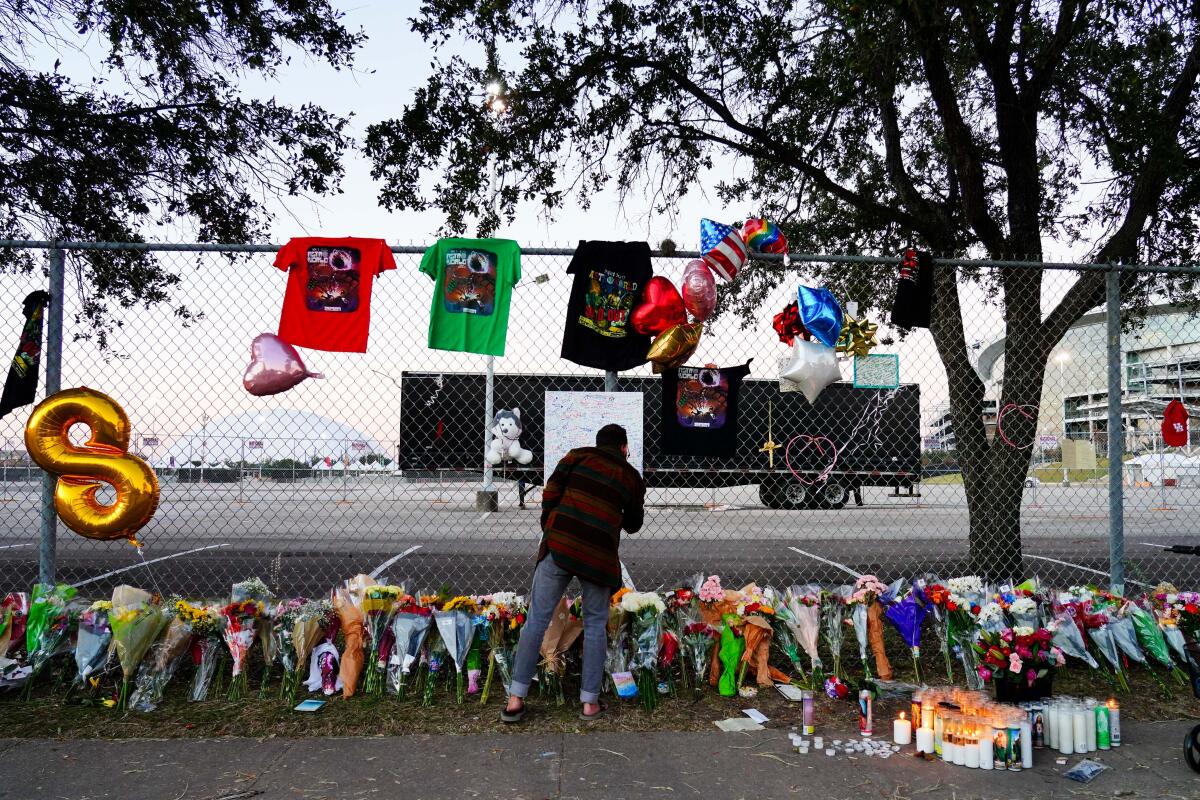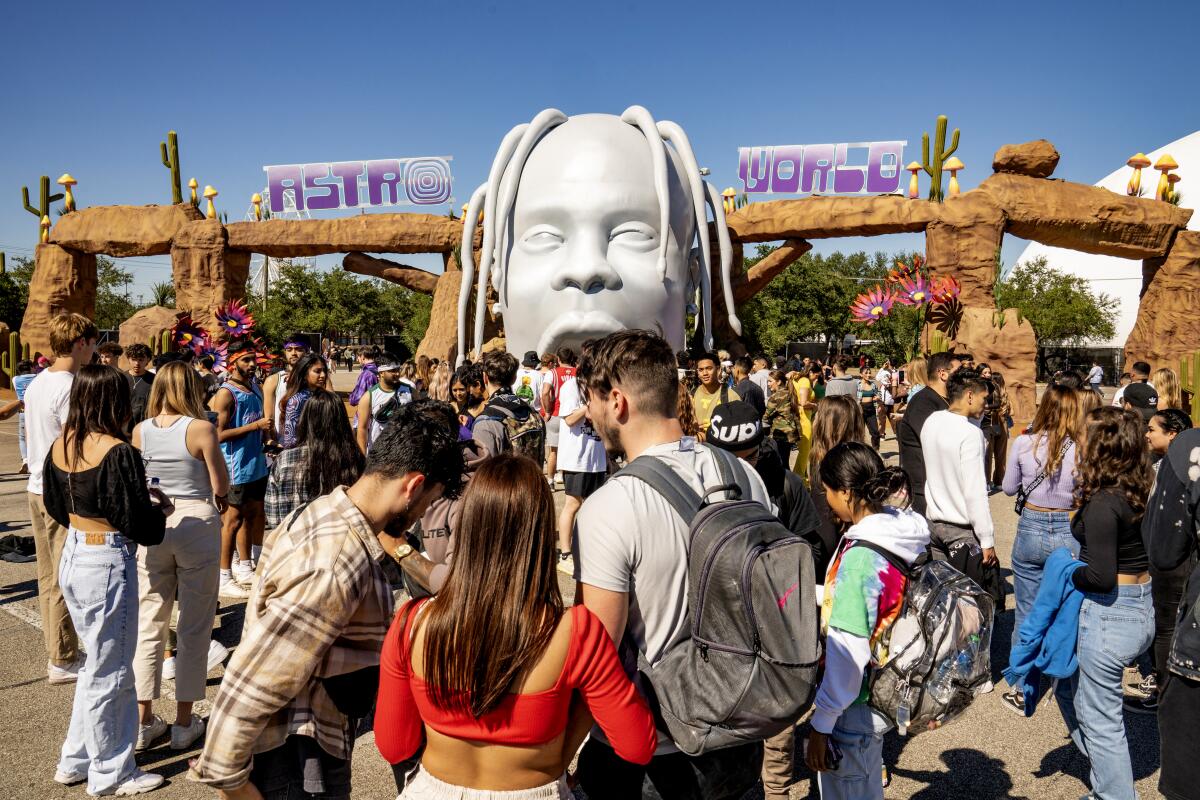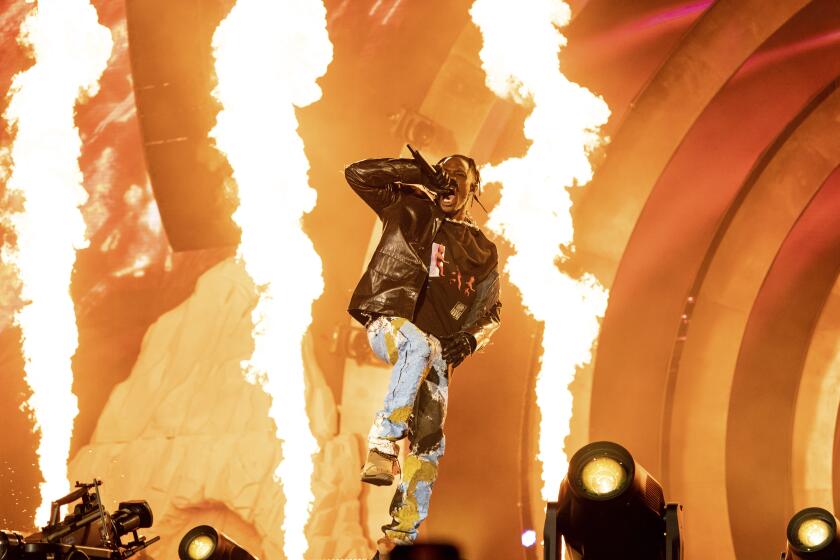Could Travis Scott face criminal charges after the Astroworld tragedy? Legal experts explain
- Share via
Just days after the crowd-crush disaster at Travis Scott’s Astroworld festival in Houston that left nine dead and hundreds injured, the number of civil lawsuits brought against the organizers has already reached well into double figures and is growing by the hour. Damages from the suits could run into the hundreds of millions of dollars or more.
The scale of the tragedy will prompt a reckoning for concert promoters, who will have to reassess logistical and safety issues surrounding festival staging, ticketing, mass-casualty planning and security and medical protocols.
But in addition to the civil claims against Scott, concert promotion giant Live Nation, Texas promoter Scoremore Shows and others, could criminal charges be filed in the wake of the Astroworld disaster — possibly even against the 30-year-old rap superstar Scott, who has a history of inciting crowds into frenzied behavior at shows?
“This is primarily a Live Nation problem, but Scott has a lot of accountability here,” said Kurt Arnold, a partner with the Houston-based law firm Arnold & Itkin, which represents more than 100 families in lawsuits related to Astroworld, including the family of one of the nine fatalities.
Astroworld is a joint venture between Scott, ScoreMore Shows and Live Nation, which owns a controlling interest in ScoreMore.
“I think it’s likely that criminal charges will be brought. I’d be shocked if they weren’t,” he added. “I don’t say that lightly, but manslaughter is a possibility. It has to rise to a standard of recklessness in Texas, you have to know of the risk and disregard it. If someone has too much to drink and kills somebody, there’s a similar standard here.”
Houston Police Chief Troy Finner said Wednesday that his department will continue its criminal investigation. Finner also said he will be meeting with the FBI on Friday to discuss the case. Texas’ penal code defines manslaughter as “recklessly caus[ing] the death of an individual.”
Music festival goers recount the chaos of that day, when eight people died, two dozen were hospitalized and scores more were injured.
In a statement Thursday, a representative for Scott said “Over the last week, Travis Scott and his team have been actively exploring routes of connection with each and every family affected by the tragedy through the appropriate liaisons. He is distraught by the situation and desperately wishes to share his condolences and provide aid to them as soon as possible, but wants to remain respectful of each family’s wishes on how they’d best like to be connected.”
In a video released after the show, Scott also said he “could just never imagine the severity of the situation” from his vantage point onstage.
Edwin F. McPherson, a member of Scott’s legal team who represented the hard-rock band Great White after its 2003 concert fire that killed 100 people, said in a statement, “There has been multiple finger-pointing, much of which has been by city officials, who have sent inconsistent messages and have backtracked from original statements.
“Investigations should start proceeding over finger-pointing so that together, we can identify exactly what transpired and how we can prevent anything like this from happening again.”

Scott has twice pleaded guilty to charges stemming from onstage conduct at concerts, first in 2015 to charges of reckless conduct after telling fans to rush the stage during his performance at Chicago’s Lollapalooza festival. He again pleaded guilt to disorderly conduct charges after a show in Arkansas in 2017.
Scott was also sued for “negligence, carelessness and recklessness” after a 2017 concert in New York, when a 23-year-old fan claimed he was pushed from an upper-deck balcony, leaving him partially paralyzed.
Three fans were hospitalized at the 2019 Astroworld festival after overrunning barricades.
All the attorneys interviewed by The Times agreed that it would be much more difficult to charge Scott or others connected to the festival criminally, rather than finding them liable in civil suits, and that the investigations into Astroworld are in the very early stages.
Live Nation, in a statement Monday, said that it is aiding in the criminal investigation and “will address all legal matters at the appropriate time.”
A 22-year-old college student who was critically injured at the Astroworld Festival in Houston has died.
In the 2016 fire that killed 36 at the Ghost Ship music venue in Oakland, Derick Almena, the venue’s operator, pleaded guilty to 36 charges of manslaughter. Craig Peters, an attorney at Altair Law in San Francisco who represented the family of the late musician Cash Askew in the Ghost Ship venue fire, said “there certainly is a possibility” of similar charges related to Astroworld.
“It’s hard to know what was known and planned for, but this artist seems to have a history with fomenting an aggressive crowd,” Peters said. “I certainly think there’s a possibility he could find himself under the microscope from a criminal perspective.”
Brian D. Caplan, a partner at Reitler Law in New York, represented the family of singer Christina Grimmie in their lawsuit against AEG Live, after the 22-year-old singer was killed by an attendee at an Orlando concert. He said prosecutors looking at Scott or others in the festival’s leadership would need to find an extraordinary level of negligence or intent to make criminal charges stick.
“It’s a very high burden of proof for a criminal case,” Caplan said. “It’s not simply negligence. You have to have wanton, willful, gross negligence to rise to that.”
Scott’s history of inciting crowds could inform a decision regarding criminal charges, though.
“Prior conduct and prior knowledge would be a factor, but just because somebody got injured or killed in horrific circumstances doesn’t necessarily mean criminal liability,” Caplan said. “There’s a difference between being stupid and being criminally responsible.”

It’s rare to see a live performer themselves criminally charged in a concert disaster, said Mary Alexander, a San Francisco attorney who represented several families of victims in the Ghost Ship fire.
“Given the trouble he’s gotten into before, Scott could be found civilly liable for sure,” Alexander said. “There’s potentially negligence from not having enough security and medical staff, not setting up safe perimeters, not having escapes or exits. But it’s also possible that negligence can rise to the level of involuntarily manslaughter. When somebody dies as a result of criminal negligence, there could be criminal liability for Scott or for individuals at these companies.”
In the 2003 Great White fire at the Station nightclub in Warwick, R.I., 100 patrons died and over 200 were injured when the band’s crew set off fireworks onstage.
The club’s owners, Jeff and Michael Derderian, and the band’s tour manager, Daniel Biechele, were each charged with 200 counts of involuntary manslaughter. Biechele pleaded guilty to 100 counts of misdemeanor manslaughter, and both Derderian brothers pleaded no contest and served time in prison.
“It has to be that a defendant acted in such a reckless way that they created a high risk of great bodily injury or death,” Alexander said. “But Scott’s behavior encouraged crowds in the past. If it’s so bad that there’s an ambulance driving into the crowd, he’s putting people into a panic.”
The question of potentially inadequate security and medical staff will also be at the center of the coming lawsuits. Planning documents for the festival reviewed by The Times cite a number of concerns from terrorism to weather, but do not mention potential crowd surges. The decision to allow Scott’s performance to continue on for 37 minutes after the Houston Fire Department declared a mass casualty event is also under scrutiny.
Video of the performance shows Scott singing and dancing as an ambulance drove through the massed crowd to reach injured fans. In videos where fans can clearly be heard calling for medics, Scott tells the crowd to hoist middle fingers “because they are ready to rage” and said “You all know what you came to do ... I want to make this motherf— ground shake.” Scott did stop the show to point out injured fans — “Security, somebody help, jump in real quick,” he said at one point — but he played the entirety of his 25-song set.
Peters agreed that the causes and responsibility for the crowd crush are multifaceted.
“The problem here existed way before the concert started,” he said, referring to the breaching of the entrance area by thousands of unticketed fans earlier in the afternoon. “You should never get to a point where that could have happened. That’s security and planning 101 — control crowd, barriers, physical security. You know what can happen and has happened before.”
Whatever the charges Scott may or may not face, his career as a top-earning live performer may be in peril regardless.
“If you’re on an offshore oil rig and something’s exploding, you shut it down,” Arnold said. “If you have Live Nation showing up with Travis Scott at an event, maybe that doesn’t happen anymore, maybe he’s not insurable anymore. This is a bad record. I think it’s unlikely you’ll see a Travis Scott concert in this form anytime in the future.”
More to Read
The biggest entertainment stories
Get our big stories about Hollywood, film, television, music, arts, culture and more right in your inbox as soon as they publish.
You may occasionally receive promotional content from the Los Angeles Times.












